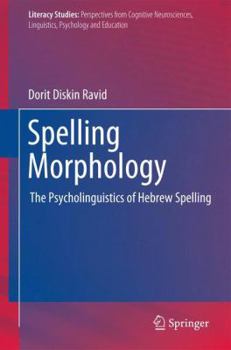Spelling Morphology: The Psycholinguistics of Hebrew Spelling
Select Format
Select Condition 
Book Overview
Modern Hebrew is a highly synthetic Semitic language-its lexicon is rich in morphemes. This volume supplies the first in-depth psycholinguistic analysis of the interaction between morphological knowledge and spelling in Hebrew. It also examines how far this model can be applied to other languages. Anchored to a connectionist, cognitive, cross-linguistic and typological framework, the study accords with today's perception of spelling as being much...
Format:Paperback
Language:English
ISBN:1461429579
ISBN13:9781461429579
Release Date:October 2013
Publisher:Springer
Length:188 Pages
Weight:0.63 lbs.
Dimensions:0.4" x 6.1" x 9.2"
Customer Reviews
0 rating





